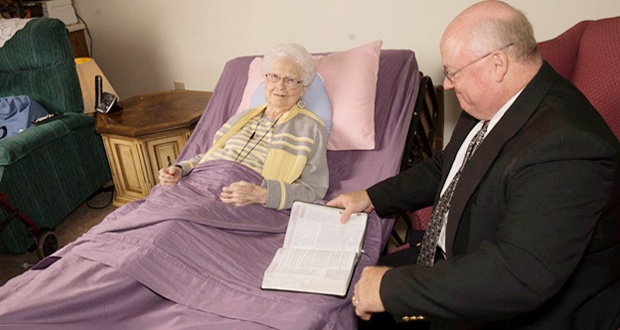What is Hospice Care at Home?
What does hospice home care mean for a patient? When you or a loved one choose hospice care, you focus on living comfortably and fully near the end of your life.
Home hospice care may be appropriate for patients with a terminal illness, and if a physician believes the patient has six months or less to live. This definition comes from the National Institutes of Health.
It is very important for a person to discuss hospice care options with a doctor. That’s because hospice care, particularly at home, can lead to a better quality of life for months. Home-based care gives the patient a chance to spend more time with family, friends and loved ones while coming to the end of life on their terms.
Some hospice patients live for years, so it’s important to remember that a diagnosis does not necessarily mean what a doctor says is what comes to pass.
How long has hospice care been around?
Modern hospice care as a formal medical practice started in 1967 in England when Dame Cicely Saunders, a nurse and medical social worker, founded St. Christopher’s Hospice in London. She is widely regarded as the first person who advocated for compassionate and better quality care for people with a terminal illness in an organized way.
How do I pay for hospice home care?
Most patients utilize Medicare or Medicaid to pay for home hospice care. Though most insurances cover this service 100%, with a physician order
What are the four levels of hospice care?
Hospice care typically involves four different levels of care, depending on the patient’s needs.
- Hospice home care. This type of care increases a patient’s comfort and quality of life in familiar surroundings. Care may revolve around managing symptoms, managing pain, utilizing spiritual and emotional counseling for the patient and family members, nutritional services, various therapy, and assistance with daily tasks.
- Continuous or crisis hospice care. This type of hospice care is for someone going through intensive symptom management or a medical crisis. A patient may need 24-hour nursing care with this level of home hospice care.
- Inpatient hospice care. A doctor may recommend inpatient hospice care for a patient whose symptoms can no longer be managed at home. The ultimate goal of this level of care is to control severe pain and symptoms.
- Respite care. Family caregivers sometimes need a break when watching over and caring for a loved one undergoing hospice care. Professional caregivers can provide respite care for a few hours a week so that family members can take care of other aspects of their lives.
What are the advantages of hospice home care?
This type of health care at home offers several benefits to patients, including:
- Cost-effectiveness. Home hospice may be more affordable than long-term care facilities and hospital stays.
- Full range of services. Home hospice agencies provide more than just medical care for a patient. They also offer various therapies, like speech, occupational, and physical therapy, as well as counseling services for families dealing with someone’s end-of-life decisions.
- Convenience. There is no more convenient place to heal than at home. The patient is in familiar surroundings.
- No limit to visiting hours and visitors. A patient has no limits or restrictions on visitors as set forth by a hospital or long-term care facility. Your loved one gets to see who they want and when they want with home hospice care.
- Customized care. We believe each patient is unique and deserves to be treated with compassion and respect. When possible, the same nurse or home health staff will be assigned to a particular patient.
- Familiar setting. Perhaps the biggest advantage of home hospice care comes from the familiar surroundings. There are no strange beeping machines, no noises in the hallway from a page for medical staff, no hubbub of activity, and no semi-private rooms with a patient in another bed. You or your loved one gets to live this stage of life on their terms.
- Trained hospice care workers. Nurses and staffers at a hospital or long-term care facility may not receive specialized training for hospice care. Home health care personnel receive formal training in hospice care, which makes it easier for your loved one to ease in this type of health care.
How long does a hospice care nurse spend at a patient’s home?
Needs vary, depending on the level of care a patient requires. The average home hospice stay is around an hour per day, three to four days per week. Some patients may see a hospice worker every day or several hours a day if the person’s symptoms are exacerbating daily tasks or pain becomes more advanced.
READ: How Physical Therapy Can Improve Your Quality of Life at Home
What does a home hospice nurse do for you or your loved one?
A hospice home nurse helps in several ways, such as:
- Monitoring vital signs. A change in vital signs can signal what, if any, changes to care a hospice patient may need.
- Medication management. The nurse will make sure prescriptions are filled properly and the patient takes medicine as prescribed by a doctor.
- Managing a patient’s symptoms and pain.This is what sets home hospice care apart from other aspects of home health care. Knowing how, when, and why to manage pain and symptoms in a hospice patient offers different outcomes compared to someone who requires home health care after a hospital stay or surgery.
- Help during a medical crisis. Someone near the end of life may face a medical crisis, such as going into cardiac arrest or breathing distress. A hospice nurse is specially trained to know when to intervene in a crisis.
- Educational support. Home hospice nurses want everyone in a loved one’s family to understand what’s going on and why. A trained hospice nurse can explain what to expect as someone goes through this stage of life.
- Spiritual, social, and psychological support. Seeing a loved one go through this part of life is hard, and it takes its toll even when we make it as life-affirming as possible. Home hospice nurses are specially trained to offer spiritual, social, and psychological support to a loved one and the family during this time.
How do I begin hospice home care for myself or a loved one?
Contact Phoenix Home Care today, or call 785.670.8407. We’ll have an honest discussion about your needs or the needs of your loved one while consulting with the hospice care team. Our overall goal is to help you or your loved one as you embark on a journey towards the next stage of life.
Team Phoenix provides hospice throughout the greater Topeka area.
Phoenix Home Care & Hospice
2945 SW Wanamaker Dr., Suite B
Topeka, KS 66614
785-260-6444





